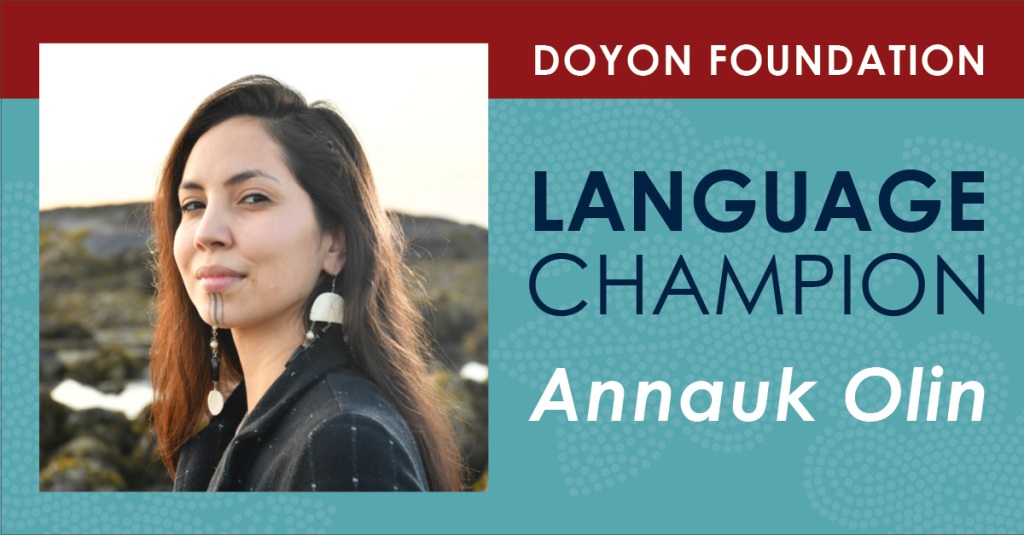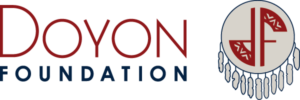“The more I learn and get to converse with Elders, the more I feel fulfilled and connected to community”
Annauk Olin, Language Champion

Aŋayuqaaka Nuluqutaaġlu Mark Pollock-lu. Ataataaka Koonuglu Nugaġlu. Annauk Olin is the daughter of Maggie and Mark Pollock. Annauk’s maternal grandparents are Elizabeth and Herbie Nayokpuk. Her paternal grandparents are Rose Marie and David Pollock. Annauk’s mother’s family is from Shishmaref and her father’s family originally is from France and Scotland.
A fluency coach and curriculum writer living in Anchorage, Annauk attended the University of Massachusetts-Amherst and the Massachusetts Institute of Technology. She holds a bachelor’s degree in comparative literature and a master’s degree in linguistics. Her main language is Iñupiaq (Shishmaref and North Slope dialects); Annauk is learning Denaakk’e (Koyukon) with her husband’s family.
Doyon Foundation: Congratulations on your recent graduation from MITILI, the Massachusetts Institute of Technology Indigenous Language Initiative. What was the program like? How does it fit into your efforts today?
Annauk Olin: The MITLI program offers a formal study of theoretical linguistics alongside an independent study of an Indigenous language. I would encourage Alaska Native language learners to apply. I was able to study syntax, phonology (the systems of sounds within a language), language acquisition, and second- and third-language acquisition.
Uqautchiq Iñupiatun kiŋuvaanaktaaksrautikput. The Iñupiaq language is our birthright. Language learning is the center of my life because it will inform our generation and next generations about who we are as a people spiritually and culturally. Right now, I’m contracting with school districts and colleges to teach immersion methods, to develop curriculum, and to work as a fluency coach.
DF: You believe that language is medicine.
AO: Yes. Revitalizing endangered languages is hard. Yet the more I learn and get to converse with Elders, the more I feel fulfilled and connected to community. Language may be difficult to access now but the more available we make it for future generations, the more spiritually and culturally grounded they will become.
I speak to my 2-year-old son primarily in Iñupiaq and he inspires me to continue building my knowledge. His name, Daał, means “sandhill crane” in Denaakk’e. My husband is Koyukon Athabascan so we’re integrating more Denaakk’e language at home. After marrying into an Athabascan family, I feel a responsibility to help my son learn his Denaakk’e language too.
DF: And your own beginnings with language learning? Who helped along the way?
AO: My mom taught Iñupiaq immersion in Utqiaġvik when I was very young. Although she did not speak to me in Iñupiaq primarily, her love of our language stayed with me my whole life.
Dr. Edna Ahgeak MacLean, the Elder who worked to complete the North Slope Iñupiaq dictionary among many other learning materials, taught me to be a conversational speaker of North Slope Iñupiaq through an adapted master-apprenticeship over the last four years. Georgianne Oonak Merrill taught me much of what I know of my family’s Shishmaref Inupiaq dialect through translation work with the Alaska Public Interest Research Group (AKPIRG). Ronald Aniqsuaq Brower taught me Iñupiaq through stories and grammar at Iḷisaġvik College and the University of Alaska Fairbanks.
Many other Elders and friends have helped me sustain Iñupiaq language speaking and learning. My graduate work in linguistics has allowed me to study existing linguistics material on Bering Strait and Malimiut Iñupiaq dialects. I hope to create grammars and curricula for Iñupiaq dialects with limited learning materials.
DF: The master-apprenticeship program – MAP – is grounded in traditional one-on-one teaching and also takes into account that Indigenous languages may not be spoken much in the home. MAP seems very promising for Alaska Native language revitalization.
AO: A few master-apprenticeship relationships exist, but the method is fairly new to Iñupiat Nunaat. I hope to create introductory materials for an Iñupiaq Master-Apprenticeship Program. Curriculum and a supportive network are critical for its success. Once they’re in place, graduating Iñupiaq speakers from a MAP and placing them in an Iñupiaq immersion school is our best shot at passing on the fluency of Iñupiaq to future generations.
DF: How has a MAP approach worked for you?
AO: Master-apprenticeship techniques have encouraged me to speak primarily in Iñupiaq to Elders, especially with Dr. MacLean. I call our apprenticeship adapted because my speaking was heavily supported through studying grammatical materials and Iñupiaq stories.
I also used self-written Iñupiaq conversations before each apprenticeship meeting as a springboard for learning about related topics. For each meeting with Dr. MacLean, I would record our conversations and listen to repeatedly while going for walks, cooking or cleaning. I also write flashcards for different verb endings and put them all over my house. Sometimes I’ll memorize endings while I’m doing another household activity.
DF: Language learning isn’t compartmentalized then.
AO: Effective language learning and speaking is a meditative practice for me. In addition to recorded conversations, my son and I try to listen each week to recorded Iñupiaq stories. We write or draw while we listen.
Ritualizing language is so important, so I pray every night in Iñupiaq and usually wake my son up with Iñupiaq songs in the morning. Creating videos of everyday activities can help others learn and internalize language too. While reading and writing have been helpful to learning Iñupiaq, listening has probably been the most important for becoming a speaker.
DF: Language learners so often say it’s important to be part of a group, to be with others who are also committed to the same goal.
AO: I’m fortunate to be a member of Iḷisiqativut, a grassroots Iñupiaq language learning collective for adult second-language learners. Many of my dear friends are also dedicated to language learning so we build on each other for support. We’ve hosted two-week Iñupiaq language intensives in all three regions of Iñupiat Nunaat. My main role at Iḷisiqativut was to facilitate immersion trainings and to write immersion curriculum.
In 2019, I started working with the Alaska Public Interest Research Group to translate census material into the Shishmaref Iñupiaq dialect. Most materials available for self-study are in the North Slope Iñupiaq dialect, so working with AKPIRG is a chance to use my knowledge of another dialect to learn my family’s way of speaking. The AKPIRG group I’m with includes speakers from the Bering Strait Iñupiaq dialect. We’ve worked together to translate materials about the 2020 presidential election and COVID-19 vaccination.
DF: What advice do you have for language learners, especially those who may find starting out is really challenging?
AO: Don’t let anything distract you from learning language. We need to think creatively about how to bring Iñupiaq into all the places where English is currently used.
DF: It sounds as if your efforts draw on several foundations – two Alaska Native languages and a formal study of linguistics, which we associate with Western scholarship.
AO: Learning Iñupiaq is connected deeply to my heart and emotions. When I first started learning to speak, I navigated many feelings of anxiety and depression, which are directly related to the ongoing Euro-American settler-colonial project.
Relationships between our Elder and younger generations have been severed, so that when it comes to speaking our Indigenous languages those ties need healing and regeneration. Without creating a way to process this trauma, it can become incredibly daunting and frustrating to learn our languages.
Sometimes people have shamed me for speaking a different dialect from my family or for learning linguistics, which is through the lens of Western education. Don’t forget that our ancestors spoke many dialects before colonization and that we can use both Indigenous and Western tools to give us a better shot at sustaining our languages.
DF: How are these insights shaping your day-to-day progress?
AO: When I feel over my head in learning, I often have to take breaks and enjoy things like reading literature, being outside, or working with my hands. I also try to facilitate time in our learning community to process intergenerational trauma. An Elder once told me that we need to heal together and not try to navigate these feelings alone.
DF: That returns us to the idea that language learning is a birthright.
AO: Bringing our languages outside the classroom and into our homes and on the land is important. We can list all the reasons why it may feel impossible to learn our languages, or we can list all the ways we will actively and concretely reclaim our language.
About Doyon Languages Online
Through the Doyon Language Online project, Doyon Foundation is developing introductory online lessons for Benhti Kokhut’ana Kenaga’ (Lower Tanana), Deg Xinag, Denaakk’e (Koyukon), Dihthaad Xt’een Iin Aanděeg’ (Tanacross), Dinak’i (Upper Kuskokwim), Dinjii Zhuh K’yaa (Gwich’in), Hän, Holikachuk and Nee’aanèegn’ (Upper Tanana).
The project officially launched in summer 2019 with the first four courses, now available for free to all interested learners.
Doyon Languages Online is funded by a three-year grant from the Administration for Native Americans (ANA), awarded in 2016, and an additional three-year grant from the Alaska Native Education Program (ANEP), awarded in 2017.
About the Language Champion Profile Series
As Doyon Foundation continues to grow our language revitalization efforts in the Doyon region, we believe it is important to recognize people who are committed to learning and perpetuating their ancestral language. We are pleased to share some of these “language champion” profiles with you.
If you know a language champion, please nominate him or her by contacting our language program director at haytona@doyon.com. Language champions may also complete our profile questionnaire here.
You may learn more about our language revitalization program on our website, or sign up to access the free Doyon Languages Online courses here.
